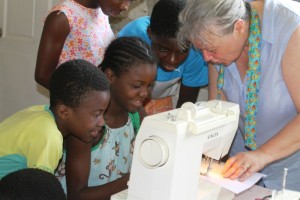Teach a Haitian Orphan to Sew and You Can Clothe Him for Life
There is an old proverb that says “Give a man a fish and you feed him for a day; teach a man to fish and you feed him for a lifetime.”
Indeed, the best form of charity is to show people how to be self-reliant. It’s not the only form of charity; often immediate measures are crucial to save people affected by disaster. But the best long-term results come from helping people to be self-reliant.
The 2010 earthquake that hit Haiti created an immense humanitarian crisis. Haiti is the poorest country in the Western Hemisphere. Approximately 70 per cent of the population lives in poverty, existing on less than $400 a year. Five years after the earthquake the country is still reeling, trying desperately to recover.
It is estimated that 15 per cent of Haiti’s children are orphaned or abandoned. Before the earthquake the number of orphans was 380,000. Since the earthquake, experts estimate the number has nearly doubled to 750,000.
High Illiteracy
It should be noted that more than 50 per cent of Haiti’s population are school age children and literacy is less than 50 per cent.
Many Christian charitable missions are in Haiti helping to rebuild the country and serve its people. A Christian orphanage and school invited my wife LaRee to Haiti to teach sewing.
She has taught adult and children sewing for many years so she accepted and will head to Haiti in July. Central Sewing, an Edmonton store, donated sewing machines; LaRee will ship them to the orphanage before she arrives.
Give an orphan a garment and it will eventually wear out; teach an orphan to sew and you clothe them for a lifetime.
We read in the Bible, “Religion that is pure and undefiled before God and the Father is this: to visit orphans and widows in their affliction, and to keep oneself unstained by the world” (James 1.27). Another Bible translation says “Keep oneself from being polluted by the world.”
True religion has external application in spiritual and charitable expression combined with inner integrity. God’s fatherly care of the widow and the orphan is expressed by his followers. Christians can prayerfully become the hands of God in the world.
We become physical expressions of God’s love, care and concern as we bring our skills, talents and knowledge to those in need. Not only do Christians provide critical provisions to people at the height of calamity, but they help them in the aftermath of disaster and provide ways for victims to re-build and to sustain themselves in the future.
Another word for charity is love. The Church teaches that charity is a theological virtue “by which we love God above all things for his own sake, and our neighbour as ourselves for the love of God” (Catechism of the Catholic Church, 1822). The next point of the Catechism says, “Jesus makes charity the new commandment.”
Jesus said, “This is my commandment, that you love one another as I have loved you.” How did Christ love us? Completely. Unconditionally. Self-sacrificially.
Most Christians (including me) are incapable of giving such Christ-like love. Yet that’s what Our Lord commanded us to do. That is where St. James’ exhortation to remain unstained by the world comes into play. The world is contrary to the perfect love of Christ.
Our own fallen nature may keep us from reflecting Christ’s perfect love to the broken and broken-hearted because we too are broken and not yet able to take in his perfect love in all its fullness. We are totally dependent on God’s grace to reflect his love however dimly.
With trembling hearts, we enter into servanthood expecting God to strengthen our weak faith. Only then can we truly become instruments of God’s will. Only then are we truly fit to serve. We confidently go into the world, not despite our weaknesses, but because of them.
Unconditional Love
Orphaned or abandoned children desperately need to be shown love unconditionally and completely just as they are. Very often, this is not accomplished by just one adult; circumstances do not allow it.
Many Christians working together to care for and nurture orphaned or abandoned children can provide a picture of Christ’s love. The sum of love is greater than the individual parts of love.
It is important to understand this to prevent being overwhelmed by human needs. We each have a place in parish life at home and in the missions abroad, whether it be through prayer, financial support or direct involvement.


